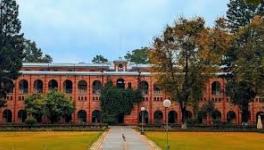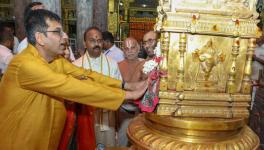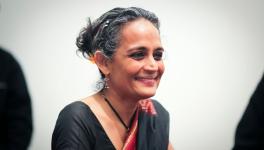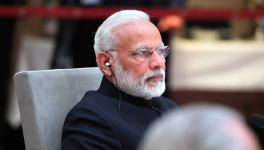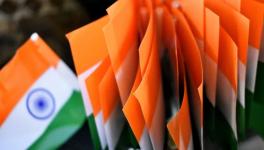Today, Hinduism’s Great Space for Diversity of Opinion is Being Crushed: Harbans Mukhia
Image for representational use only.Image Courtesy : picswe
Eminent historian Harbans Mukhia talks about why it is not just dissent but India’s diversities that are being marginalised under the current dispensation. The reassertion of diversity is often taken for granted, even by those conversant with Indian history. However, Mukhia argues that once non-conformity has been sent to the margins, it could cease to matter in social life.
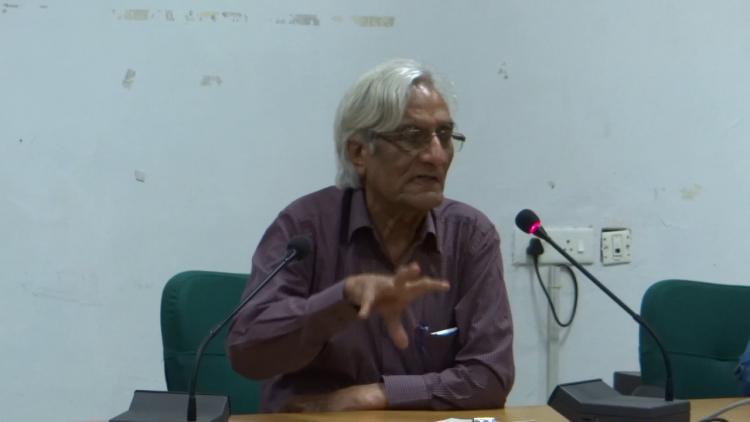
Harbans Mukhia. IMAGE COURTESY : YOUTUBE
The Bharatiya Janata Party talks about its idea of a ‘New India’. How is this India different from the one you studied as a historian?
In the 6th century, the Greek philosopher Heraclitus used a poetic phrase to describe change —‘change is the only constant’, he had said. This change always occurs through an interaction between State and society. The State is often the prime mover of changes in religion, economic structures and social relations. Buddhism spread during Ashoka’s reign in the 3rd century, early Roman theologians and emperors, Augustine and Constantine, spread Christianity. Islam and Hinduism became dominant through State patronage.
But society also lays down some parameters for change, for example, through social movements. So, Buddhism did not come into being through the State. Buddha, though a king, arrived at his vision of Buddhism as an individual. Islam was also spread through people. Therefore, society, in a way, creates the State’s agenda. Today, this interaction between State and society is ceasing and not just in India. The defining feature of State and society in the 20th and 21st centuries—democracy, elections and so on—is changing. Today, State action has completely hollowed out democracy. Elections everywhere are total manipulations. There is also manipulation of the agenda, quite apart from manipulation by money and muscle.
What is the result of this manipulation?
The difference is that now the State is laying down the agenda, whether in the United States or Turkey or India. Through this agenda, the State gets from society the response that it has already arranged. Outcomes are what the State has already envisioned. Elections have become merely event managements, losing their meaning as representations of the will of the people.
Is this because of a palpable lack of dissenting voices?
Theoretically, dissent is a part of democracy. The State needs voices of dissent, some divergence in views or else it collapses very quickly. Stalin’s State collapsed right after he died. Hitler’s State collapsed during his lifetime. Hence, the State leaves some space for dissent to allow those voices that do not challenge the status quo. The change happening today is that people are supporting State power [not dissent].
Why is the opposite reaction not being generated; if the State is becoming strong, why does dissent not rise proportionately?
The reason is State control over institutions, especially the media. It has become very difficult to find audiences who are critical of what they see in the media. To critique the media requires a vast store of knowledge, which is not easy to acquire even for educated people. To critique the State, society, civilisation or religion is in any case very hard. But it is crucial to be critical of religions everywhere. Today, Hinduism’s great space for diversity of opinion is being crushed. As the State becomes all-encompassing, it is determining the social, economic, political and national agenda.
What defines that agenda?
In the 19th century, the slogan of nation-state was raised, and European nations went to war. Then came the globalisation slogan and it cut across national boundaries and broke economic barriers. Today, we are back to the idea of nation, and a closed nation at that. The British government cannot decide whether to become a part of the European Union, the US has a crisis over immigration. In countries like India and Turkey there is also a bombardment of messages from the social media. Social media is a very democratic phenomenon, but it has opened space for totally absurd views and abuse. The devastating effect of this is that social media has become a conduit for organised interventions. An individual’s opinion, even abuse, would add to the diversity of views. Particularly in India, the organised intervention of social media is so one-sided that it kills diversity. Therefore, it has become the very anti-thesis of democratic access.
Therefore, this is not just a crackdown on dissent but diversity?
Yes, what is happening in India is the closing of spaces of diversity. You say one word against [Prime Minister Narendra] Modi and you are called ‘anti-national’. The equation of anti-national with anti-Hindu is taking place and it is selling. For example, people accepted that JNU (Jawaharlal Nehru University) is ‘anti-national’.
Would India’s diversity prevent this from exceeding a certain point?
That is our one fallback opinion, that India’s diversity will not allow one viewpoint to dominate all other views. Indeed, India has developed its diversity through history. Since prehistoric days, a tremendous number of groups migrated to India and it faced numerous invasions. This is not a unique thing. Every inch of the world has seen migrations, even Iceland and Newfoundland, the remotest and coldest zones on the planet. And all of humanity is a mixed race.
Therefore, it is impossible to say who is an insider or outsider?
There is no insider or outsider. This idea is entirely a creation. The concept of nation as it developed in the 18th and 19th centuries defines insider and outsider, based on passports. To hold a British passport makes you an insider in Britain, or else you are an outsider. It was as simple as that. Even earlier, military action defended boundaries, but these were not the boundaries of nations but empires.
Are perceptions about what constitutes a nation radically different today than from our past?
They are radically different. To every empire or kingdom, grandeur was a very important aspect of creating a sense of belongingness. The idea that the Ashoka Empire is ‘great’, that it is ‘massive’, gave people a sense of belonging. This perception of greatness and grandness existed in the past, as it does today. So, we say that ‘India is a great country’ and therefore ‘I am proud of being Indian’. We also hear ‘Hinduism is a great religion’ and therefore ‘Garv say kaho hum Hindu hain’—say with pride that you are Hindu. Cultural grandeur is a very important aspect of belonging. The word Mughal, even today, is equivalent to grandeur. We call Vijay Mallya a ‘liquor Mughal’ and use the term ‘movie Mogul’. The word Mughal creates a sense of belonging so that when you see the Taj Mahal, you feel proud to say that this is my country and this monument belongs to me.
But the era of grand constructions is over.
Not just the grandeur of monuments but the values have changed. In the past, the territories of empires or nations constantly expanded and contracted. Expansion would create a sense of grandness and, therefore, defined the value of being an insider or outsider to an empire. Today, territories possessed by nation states are more or less frozen. So, you project grandeur through your economy instead. You claim that you are a great economic power or talk about the glory of your culture. Our country has transferred grandeur to the territory of religion. We are creating the glory of Hinduism and in the process also creating an ‘other’. So, if you are not a ‘proud Hindu’ then you are the ‘other’. Or you are ‘anti-Hindu’ and, therefore, ‘anti-national’. The grandeur of the US is economic grandeur, its military power, the vastness of its territory and influence around the world. These things India cannot claim, obviously, and, therefore, it claims grandeur of religion and culture. We see this expressed in terms such as purani sabhyata—old civilisation.
Is this a mistake, to talk about grandness of culture?
Some kind of grandeur is always encouraged to build a sense of belonging. But the Prime Minister says that [the Hindu god] Ganesha is a creation of plastic surgery. Absurdities of this kind are being peddled by vice-chancellors [of universities]. The culture being promoted is not the culture of Taj Mahals, monuments and miniature paintings but the culture of religion. The idea that Hinduism is a great religion, is propagated but there need not be any specific illustration of its greatness.
Speaking of plastic surgery, what do you make of the notion of grandness in the context of the National Register of Citizens or the kind of inclusion that revoking Article 370 and Article 35A in Jammu and Kashmir reflects?
At present our grandeur is not inclusive but has exclusivity as a fundamental premise. It is a vision that says that if you are not with us then you are against us. This is a very different definition of grandeur. Earlier, we would hear the phrase ‘the sun never sets on the Empire’. The grandeur of that empire was inclusive. In the colonies, the empire had the ‘other’, but as colonies they were part of the empire. The US is now talking about immigration but its grandeur did not evolve on the basis of exclusion. On the other hand, it was the inclusion of various peoples that created its grandeur. What is being encouraged in India today is the idea that if you are not a Hindu then you do not belong to its grandeur; that you are an outsider to not merely the culture but even the territory. This is why you so often hear ‘get out of India’.
If empire and nation alike promote grandness, could you compare political life in the past with how it is now?
This is the advantage of being alive so long, that you are witness to so many events. In 1967, a marvellous change overtook India. The Congress party had lost state elections everywhere -- from Punjab to West Bengal. That gave us enormous hope for change because it was for the first time that the Congress had lost elections, though it retained the Centre.
The resentment against the Congress was over rising prices at the time...
Yes, at the time, a cup of coffee at the India Coffee House in Connaught Place [now Rajiv Chowk] in Delhi, used to cost four annas. Every evening the intelligentsia—which has monopoly over intelligence and a monopoly over poverty—would gather there for coffee. Suddenly, the price of their coffee rose by one or two annas. Because of this, someone created a Price Rise Resistance Movement in the coffee house. Somehow, this movement spread across the country. Nobody knew of it, but I witnessed how from this coffee shop, a social unrest was triggered everywhere. Certainly, it spread across North India, but as it went East and West, it brought down Congress governments everywhere. Particularly for us on the Left, this movement created an aura of hope that things are going to change. Professors Randhir Singh and Bipin Chandra and I, though I was quite young, were all involved in this movement. We were in the Communist Party of India (Marxist) at the time. We started going to villages in Punjab and creating awareness of what is going to happen. On one of these visits, the great Punjabi poet [Avtar Singh] Pash had come. I don’t remember what poem he recited but I recall a line from another poet at that session. ‘Oye Kranti Tu Aundi Kyon Nai’—‘O, revolution! Why don’t you come?’ That is how desperate we were for revolution. But we were childish at the time. Very soon, the system recovered and the next elections brought Indira Gandhi back with a massive majority. The revolution dissipated but 1967 gave us hope that things can change, although they didn’t that time.
So the difference between the past and now is hope.
After Independence, Prime Minister Jawaharlal Nehru had also created hope of a better future with his speeches. In his halting Hindi, he talked about economic self-reliance, parliamentary democracy, planning and so on. Coming back to the notion of grandeur, at the time Nehru, [Gamal Abdel] Nasser of Egypt and [Josip Broz] Tito of Yugoslavia were the three makers of the Non-Aligned Movement. They were considered world leaders because they had stood up against, or at least between, the US and the USSR. This gave us a great sense of pride. It also made Nehru’s vision very enchanting and encompassing. Nehru is much maligned now, but you have to read his book, The Discovery of India, to realise how deeply he appreciated Hindu culture. He understood it in a way that Modi or [Home Minister Amit] Shah or [former deputy PM Lal Krishna] Advani do not. The only Hinduism they know is from the Rashtriya Swayamsevak Sangh (RSS) and that is Hinduism as a homogenising power. This is what Hindutva is—power over others. And the ‘other’ in Hindutva means Muslims.
How would you characterise this change?
The other difference was the great space for dissent. Once, a colleague and I spoke on a radio discussion programme. He talked about India’s progress and I, being an old-time Marxist, talked about how the system cannot work—the usual shibboleths on both sides (laughs). Afterwards, my colleague said that I had been very bold to speak against the system. I remember telling him that destruction of the system is also a part of the system. So, we could say at the time that the system is far too corrupt, that it will not last...and that is exactly what happened. Indira Gandhi laid the foundation in the late seventies for the suppression of dissent. She also laid the foundation of institutionalised financial corruption. Not for herself but for her party, and that has been going on since then. Now corruption is so institutionalised that you cannot even question it. A Bill was unanimously passed in the Lok Sabha recently that forbids even asking questions about contributions to political parties.
So we have come further down the road to deny dissent?
Indira Gandhi took the first step but now we want to deny any freedom to criticise. Those who do not want to hear any criticism always say ‘you have all the freedom to criticise—but.’ The “but” is always there and it means ‘we will tell you how much we want to be criticised’. I worry about what is being done to our society. The economy can recover if it goes down, but society cannot recover.
Why can society not recover?
Go back into our history.
To Partition?
Partition yes, but beyond. India recovered very quickly from Partition.
Some would say that we have still not recovered from Partition.
In a way yes, the Partition laid down the terms and that is why we still hear the slogan ‘go to Pakistan’. Still, the fact remains that Islam came to India first and Muslim kings came later. Islam changed society—I am not saying for the worse. Before that Buddhism changed society, as did the reassertion of Hinduism in the Gupta period. But these changes did not kill all of India’s diversities. Therefore, to assume that because there is diversity it will reassert itself... It will yes, the diversities will not die. Even in a country like Pakistan there is diversity. But diversities as a kind of social force by themselves get dominated by this kind of a homogenising power. Diversity need not be wiped out, surely, but they get overwhelmed and therefore, marginalised. They survive at the margins. As they do in Pakistan.
And diversities on the margins cannot threaten the state?
That is the big change that has taken place. Namely that there is an organised—as opposed to evolved—programme to establish a homogenous society. We are looking at a homogenous party running a homogenous democracy pursuing homogenising economic policies and above all they seek a homogenous culture and society. In just one way, I am almost becoming an admirer of the RSS. A hundred years ago, in 1925, its founders had a vision of some day changing India according to their vision and that vision is what we see. They moulded society to prepare it for their vision. There are RSS branches and shakhas everywhere. They set up Shishu Mandir schools for children, where they fermented their RSS ideas. Now what is likely to happen is a correspondence of political power and the social organisation [RSS]. Hence, not only the RSS itself but its influence on society will spread. This confluence between political power and social organisation did not exist earlier. There was an interaction between the state and society in the past but that is being overrun by this dominance of the RSS.
Can we call it a kind of second Partition, as a columnist in The New York Times recently said?
Partition is a territorial concept, so I don’t think it is an appropriate term, but there is a partition in the sense of social division. Minds are being partitioned. You have to take one side or the other. You have to say ‘Jai Shri Ram’ or be an outsider. You cannot say that you are a Hindu but will not say ‘Jai Shri Ram’ or whatever else is demanded.
As a historian takes a longer-term view, what is your outook for the future?
The British also made enormous and fundamental changes in India yet even that dominance began to erode in the long run. Today’s dominance will also face challenges, particularly when the avenues to do so are so wide open. My complaint is with the Opposition. The writing on the wall before the 2019 elections was that they must unite but they let local-level pettiness overwhelm them. Sometimes the alliance between the Samajwadis and the Bahujan Samaj Party was supposed to work wonders; at other times, it was deemed ‘unworkable’. The then Congress president Rahul Gandhi let an alliance partner be the chief minister in Karnataka but his own party’s [former chief minister K] Siddaramaiah was unwilling. On the whole, the Opposition does not have a grander vision that India needs.
The BJP appears to be getting stronger as a result.
Remarkably, there are no defections from the BJP while there are huge defections from the Congress and others. Even the BJP’s critics, such as Yashwant Sinha, have not joined any other group despite walking out. The BJP has created a system where the stakes are very high and other parties have not been able to create such a system. There is no alternative to creating a ground-level political narrative and this is what the BJP and RSS victory proves.
The effort of the party in power is not solely to drive electoral victories though...
Their vision is of Hindu Rashtra, which is why they constantly fiddle with the Constitution, erode it, in a way laughing at how they can manipulate it any way they want, as they have done in Kashmir. They call Article 370 a ‘temporary’ provision—whatever justifies their point of view. Our Constitution is supposed to give us rights and it is also open to gross manipulation and violation of its own provisions. That is what they are practicing and are getting away with it. The ultimate loser will be the people because if you are creating a society that is constantly engaged in tensions vis-a-vis the ‘other’ then you will be a loser, including Hindus. That is why I mentioned that things keep changing. One must not forget Heraclitus.
Get the latest reports & analysis with people's perspective on Protests, movements & deep analytical videos, discussions of the current affairs in your Telegram app. Subscribe to NewsClick's Telegram channel & get Real-Time updates on stories, as they get published on our website.












